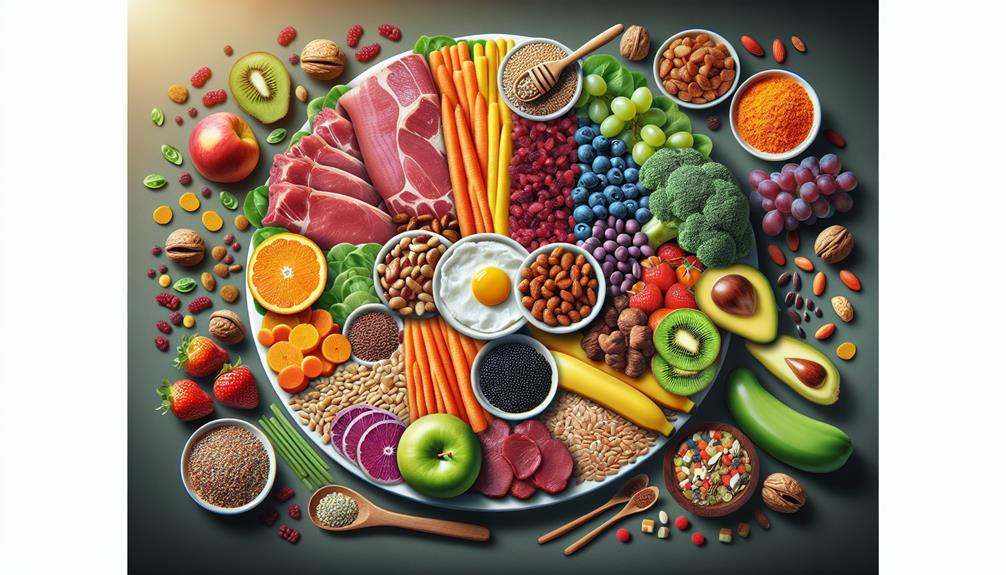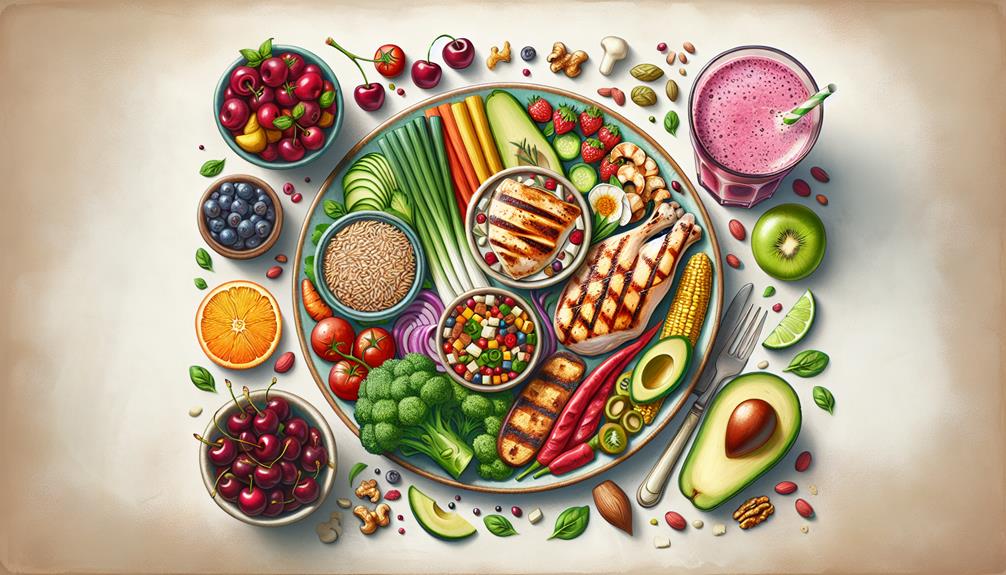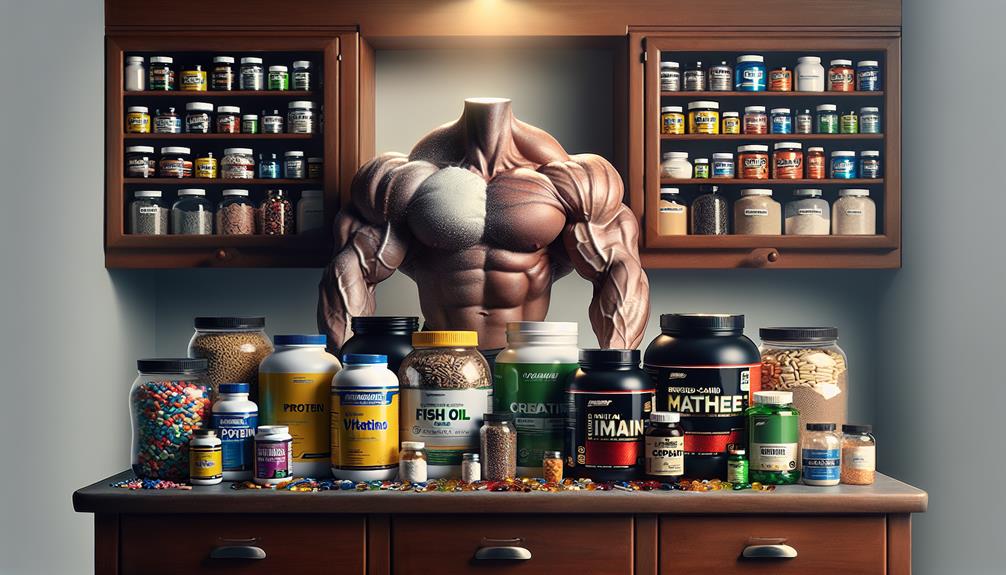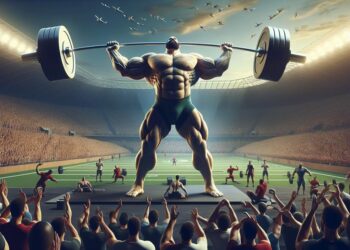When it comes to achieving massive strength, strongman athletes understand the importance of fueling their bodies with the right nutrition. You know that it takes more than just lifting heavy weights to reach your full potential. But what exactly does it mean to fuel your body for optimal performance? In this discussion, we will explore the macronutrient needs of strongman athletes, delve into strategies for pre-workout nutrition, discuss fueling for endurance and recovery, uncover hydration strategies, and even touch on the incorporation of supplements for performance enhancement. So, get ready to discover the secrets behind fueling your body for massive strength, because the path to success lies in what you put into it.
Key Takeaways
- Carbohydrates are the primary source of energy for strongman athletes, and complex carbohydrates like whole grains, fruits, and vegetables provide sustained energy.
- Proteins are crucial for muscle repair and growth, and lean sources like chicken, fish, eggs, and dairy products should be included in the diet.
- Fats are important for hormone production and brain function, and including sources of healthy fats is essential for strongman athletes.
- Proper hydration, replenishing electrolytes, and monitoring urine color are crucial for optimal performance and recovery for strongman athletes.
Understanding Macronutrient Needs

To optimize your performance as a strongman athlete, it is essential to have a clear understanding of your macronutrient needs. Macronutrients, which include carbohydrates, proteins, and fats, are the building blocks of your diet and play a crucial role in fueling your body for intense training sessions and competitions.
First and foremost, carbohydrates are your body's primary source of energy. They provide the fuel needed for high-intensity exercises and help replenish your glycogen stores. As a strongman athlete, you should aim to consume complex carbohydrates such as whole grains, fruits, and vegetables, as they provide a steady release of energy throughout the day.
Proteins, on the other hand, are essential for muscle repair and growth. They help repair the damage caused by intense training and promote muscle hypertrophy. To meet your protein needs, include lean sources such as chicken, fish, eggs, and dairy products in your diet.
Lastly, fats are an important macronutrient that should not be neglected. They provide essential fatty acids that support hormone production, brain function, and overall health. Incorporate healthy sources of fats such as avocados, nuts, and olive oil into your meals.
Optimizing Pre-Workout Nutrition
Now let's focus on optimizing your nutrition before your workout to maximize your performance as a strongman athlete. Pre-workout nutrition plays a crucial role in providing your body with the energy and nutrients it needs to perform at its best. By fueling your body properly before training, you can enhance your strength, power, and endurance. Here are three key tips to optimize your pre-workout nutrition:
- Hydration is key: Make sure you are well-hydrated before starting your workout. Dehydration can negatively affect your performance and lead to fatigue and cramping. Aim to drink at least 16-20 ounces of water or a sports drink 2-3 hours before your training session.
- Carbohydrates for energy: Consuming carbohydrates before your workout provides your muscles with the necessary fuel to perform at a high intensity. Opt for easily digestible carbohydrates such as fruits, whole grains, or energy bars about 1-2 hours before training.
- Protein for muscle repair: Including a source of protein in your pre-workout meal or snack can help stimulate muscle protein synthesis and aid in muscle recovery. Good sources of protein include lean meats, poultry, fish, eggs, or plant-based options like tofu or lentils.
Fueling for Endurance and Recovery

Ensure optimal endurance and support efficient muscle recovery by fueling your body with the right nutrients after your workout. After intense exercise, your body needs to replenish glycogen stores, repair damaged muscle tissue, and reduce inflammation. To achieve this, focus on consuming a combination of carbohydrates and protein within 30 minutes to an hour post-workout.
Carbohydrates are essential for replenishing glycogen stores in your muscles and liver. Opt for complex carbohydrates like whole grains, fruits, and vegetables, as they provide a steady release of energy and essential nutrients. Aim for a ratio of 3:1 or 4:1 carbohydrates to protein to maximize glycogen replenishment.
Protein is crucial for muscle repair and growth. Include a high-quality protein source such as lean meats, poultry, fish, eggs, or plant-based options like tofu, tempeh, or legumes. Aim for 20 to 30 grams of protein to promote muscle recovery.
In addition to carbohydrates and protein, don't forget about hydration. Proper hydration is vital for endurance and recovery. Drink plenty of fluids, preferably water or a sports drink that contains electrolytes to replenish what you've lost through sweat.
Hydration Strategies for Strongman Athletes
After effectively fueling your body with the right nutrients post-workout, it is crucial for strongman athletes to implement hydration strategies to maintain optimal performance and aid in recovery. Hydration plays a vital role in supporting muscle function, regulating body temperature, and preventing dehydration. Here are three key hydration strategies to keep in mind:
- Drink plenty of water throughout the day: Staying hydrated starts before your workout. Aim to drink at least 8-10 glasses (64-80 ounces) of water each day. Carry a water bottle with you and sip regularly to ensure you are adequately hydrated.
- Replace electrolytes: During intense training sessions, you lose not only water but also essential electrolytes like sodium, potassium, and magnesium. Replenishing these electrolytes is crucial for maintaining proper muscle function and preventing cramping. Consider using electrolyte-enhanced sports drinks or adding electrolyte tablets to your water.
- Monitor urine color: One simple way to assess your hydration status is by monitoring the color of your urine. Ideally, your urine should be a pale yellow color. If it appears dark or concentrated, it is a sign that you need to drink more water.
Incorporating Supplements for Performance Enhancement

To optimize performance and enhance your strongman training, incorporating supplements can provide additional support for your body's needs. While proper nutrition and hydration are essential, supplements can help bridge any nutritional gaps and support muscle recovery and growth. One important supplement for strongman athletes is protein powder. Protein is crucial for muscle repair and growth, and supplementing with protein powder can help ensure you meet your daily protein requirements. Creatine is another popular supplement among strongman athletes. It helps increase muscle strength and power by replenishing the ATP stores in your muscles. Beta-alanine is also beneficial as it enhances muscular endurance, allowing you to push through those grueling training sessions. Additionally, fish oil supplements can provide omega-3 fatty acids, which have anti-inflammatory properties and support joint health. Lastly, multivitamins can help cover any micronutrient deficiencies in your diet, ensuring you have all the necessary vitamins and minerals for optimal performance. Remember, supplements should complement a well-rounded diet and training program, so it's important to consult with a healthcare professional or registered dietitian before incorporating any new supplements into your routine.
Frequently Asked Questions
How Can Strongman Athletes Ensure They Are Getting Enough Micronutrients in Their Diet?
To ensure you're getting enough micronutrients in your diet as a strongman athlete, focus on eating a variety of nutrient-dense foods like fruits, vegetables, lean proteins, and whole grains. Consider working with a registered dietitian for personalized guidance.
Are There Any Specific Foods or Supplements That Can Help Improve Muscle Recovery After a Strongman Workout?
To improve muscle recovery after a strongman workout, focus on protein-rich foods like lean meats, eggs, and Greek yogurt. Additionally, supplements like whey protein and branched-chain amino acids can aid in recovery.
What Are Some Effective Strategies for Preventing Muscle Cramps During Intense Strongman Training Sessions?
To prevent muscle cramps during intense strongman training sessions, make sure to stay hydrated by drinking plenty of water. Additionally, include foods rich in electrolytes like bananas and coconut water in your diet.
Can Strongman Athletes Follow a Specific Diet Plan, Such as a Ketogenic or Vegetarian Diet, and Still Meet Their Nutritional Needs?
You can definitely follow a specific diet plan, like keto or vegetarian, and still meet your nutritional needs as a strongman athlete. It's all about finding the right balance and fueling your massive strength.
Are There Any Specific Hydration Strategies That Can Help Improve Performance and Reduce the Risk of Dehydration in Strongman Athletes?
To improve performance and reduce dehydration risk, strongman athletes should follow specific hydration strategies. These strategies can help you stay hydrated during intense training and competitions, leading to better overall performance.
Conclusion
In conclusion, fueling your body with the right nutrition is essential for strongman athletes to maximize their strength and performance. By understanding your macronutrient needs, optimizing pre-workout nutrition, fueling for endurance and recovery, and staying hydrated, you can enhance your athletic abilities. Additionally, incorporating supplements can further enhance your performance, like how adding spices to a dish elevates its flavor. So, just like a well-seasoned meal, make sure to nourish your body properly to unleash your true strength potential.













